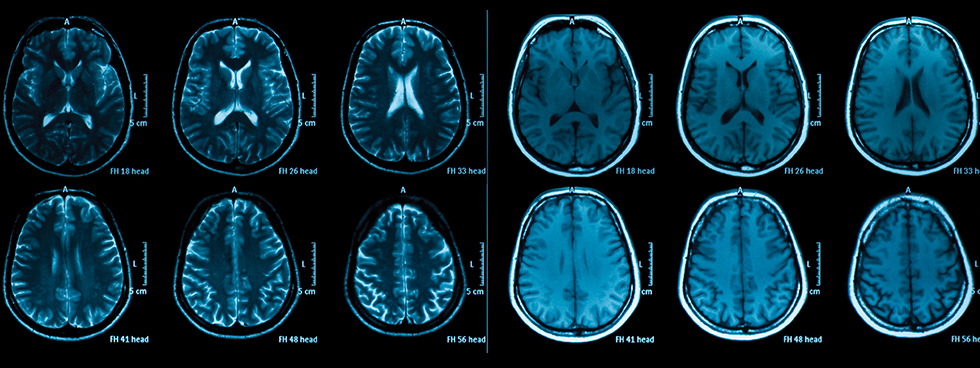Does Your Brain Grow Back?

From centuries of science, the answer to this question is unmistakably “Yes”. Scientists have watched nerve cells grow back, both in the peripheral nervous system (muscle and sensory) and the central nervous system (brain) after they have been injured. The more interesting questions might be: How fast does brain tissue regenerate? How fast do brain cells die? and can we slow down brain-cell death and speed up brain-cell regeneration? If brain cells are growing back faster than they die off, then the brain is growing back. If brain cells are dying off faster than growing back, then the brain is degenerating.
As with most questions that effect our health, the real answers to these questions (and more) are found in how brain cells work, live and die. The difference between Parkinson’s Disease, Alzheimer’s Disease, ALS, MS, age-related dementia, and other neurodegenerative diseases can be found simply in what type of brain cells die off or stop functioning and which are not replaced quick enough.
There are estimates that the human brain has about 100 Billion nerve cells and 1 Trillion glial cells (the cells that help the nerve cells out). The glial cells produce the materials, hormones and neurotransmitters (proteins, serotonin, dopamine) that are needed for the nerve cells to function. In the brain, these vital materials get shuttled around by the flow of the brain fluid (cerebral-spinal fluid) created in the brain that flows through channels (ventricles) inside the cholesterol jelly that holds our brain together. To maintain normal mental ability, you need only about 20 Billion (20%) of the nerve cells in the brain to be working and the brain fluids must keep flowing.
What causes brain cells to die or stop functioning? The answer is always related to stress. Stress can be related to many things, such as toxins (like heavy metals, neurotoxins, alcohol, anesthesia) that have somehow made it into the brain, or the lack of beneficial minerals (like copper, magnesium, selenium, lithium) that are needed by the brain cells. Stress can also be related to nervous overuse (like worry, emotional trauma, stimulatory drugs) that cause a build-up of oxidants and free radicals. Stress can also be caused by a traumatic injury (like an accident, fall or blow to the head) that physically damages the soft tissues or something that limits blood and oxygen flow to the brain cells.
Another type of stress that is a factor in Alzheimer’s or Parkinson’s Disease comes from the build-up of protein “nets” (like amyloid beta proteins) in the brain that choke the brain cells and have not been sufficiently washed out by the brain fluid flow. Some recent exciting advances toward reversing Parkinson’s and Alzheimer’s Disease involve chiropractic adjustments to the upper neck that clear the brain-spine fluid channels and increase the flow that washes out the built-up proteins in the brain.
In all cases, stress on the nerve cells causes a build-up of oxidants (oxidative stress) inside the nerve cells. This can be a good thing or a bad thing. It is good because oxidative stress can stimulate the redox signaling network (reduction oxidation) inside the nerve cell to repair damage in the cell, restore the blood flow, reduce the inflammation, reduce the oxidative stress and clean up the proteins and take out the toxic garbage. The bad thing is that if this repair process doesn’t happen fast enough, then the build-up of oxidants will inflame the brain cells and eventually cause them to undergo programmed cell death. Most brain-cell death in an injury is not caused by lack of oxygen, but by oxidative stress that has gone on too long.
Timely reduction of oxidative stress in the brain helps promote brain-cell health and longevity. New redox signaling technologies have produced compounds that are perfectly safe, can make it into the brain, and are shown to increase oxygen, reduce oxidative stress, reduce oxidation, reduce oxidized cholesterol, reduce neuroinflammation, open detoxification channels, and enhance the redox signaling networks. Much research still needs to be done. The timely reduction of oxidative stress in the brain is an important key also to the regeneration of nerve cells. As mentioned above, nerve cells can regenerate or form new connections that help to restore brain function when they are in an optimal environment surrounded by the fluids and materials they need to thrive.
Another important factor is that brain-cell regeneration is also stimulated by use. If you are using your brain to near exhaustion (just like in muscle cells) the brain will generate new cells to keep up the activity. Otherwise, non-exercised brain cells will eventually die off. It is the old “use it or lose it” syndrome.
Sadly, the slow processes of brain-cell death in degenerative diseases (as mentioned above) are not obvious until more than 80% of the brain cells have already died or stopped functioning. This means that reversing these degenerative diseases, if possible, requires large-scale regeneration of the brain. Nerve regeneration is generally a slow and careful process. So even if we succeed in slowing the degeneration down and speeding brain regeneration up to the point where the brain is growing back, we can expect that the restoration of full brain function will still be a long and difficult process. The good news is that the brain can grow back and we are developing the technologies that make this process happen faster. There is hope and a wonderful future with these emerging technologies, if we will let it be.
